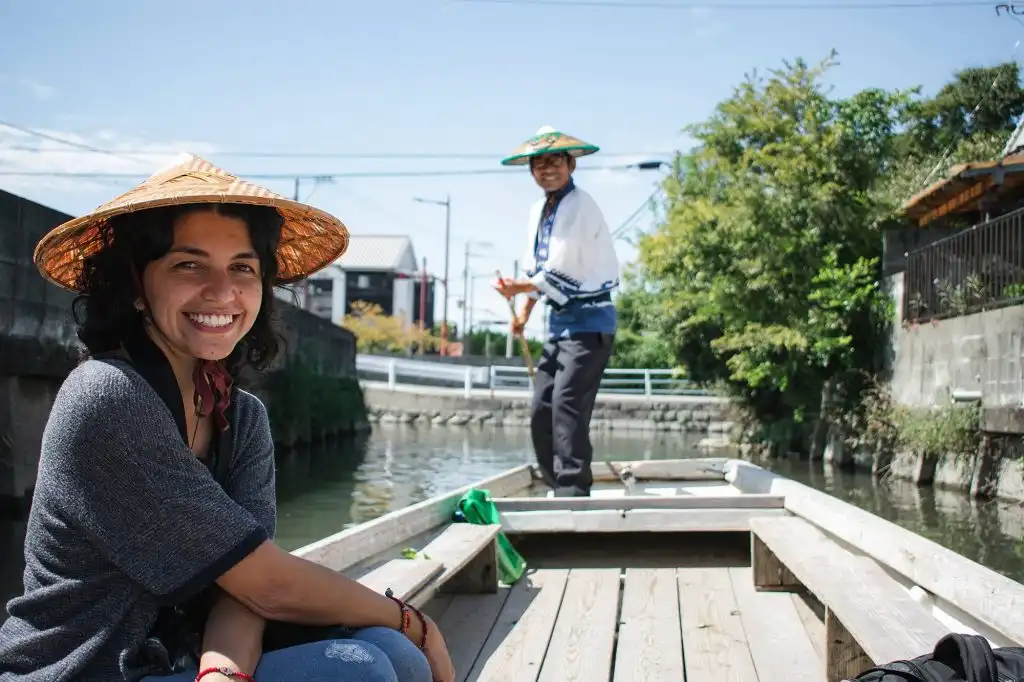- TEFL Courses
- New to TEFL New to TEFL
- Locations
- TEFL Jobs
- Teach Abroad Teach Abroad
- Teach English Abroad
- Teach English in Japan
- Teach English in South Korea
- Teach English in Spain
- Teach English in China
- TEFL Salaries Abroad
- Requirements for teaching abroad
- Teach English abroad without a degree
- How to find teaching jobs abroad without experience
- Can you teach English abroad as a non-native speaker?

- Teach Online
- About Us
- Blog
- Podcast

Teaching English In Japan: Warren & Natasha’s Story
Hello, travellers and English teachers alike! I'm Warren from Australia, and with me on this incredible journey is Natasha from Mexico. We've been travel partners for the last 8 years, since a serendipitous meeting in Thailand in 2015, but that's a tale for another day.
Today, I'm excited to share with you our adventure of teaching English in Japan, a chapter filled with challenges, joys, and endless discoveries in the vibrant city of Fukuoka.
Teaching English In Japan: A Perspective from Warren (Australian) & Natasha (Mexican)
In 2018, we embarked on an adventure to Japan , a country that seamlessly weaves tradition with modernity. I easily secured a working holiday visa, thanks to my Aussie passport which made my transition very smooth.
Natasha, hailing from Mexico, took the student visa route, balancing her Japanese language studies with teaching English. This journey was not just about teaching, but also about immersing ourselves in a new culture, learning a new language, and experiencing life in one of the world's most fascinating countries.
Requirements To Secure An English Teaching Job in Japan

TEFL Certification
Our first step towards teaching English in Japan was obtaining a
TEFL certification
. This qualification is the key to entering the Japanese ESL market. In Japan, the
120-hour TEFL Certificate
is highly regarded and often a prerequisite for many teaching positions, so it is well worth getting! It's more than just a certificate; it's a validation of your ability to teach English effectively in a foreign country.
We completed this certificate while we were living in China. All in all, it took us about 6 weeks to complete and we were working on it about 2-3 hours per day, 5 days a week.
Do You Need A Degree To Land A Job?
This question often pops up among aspiring English teachers. Natasha had a bachelor's degree, which certainly streamlined her job hunt. However, I ventured into this realm without a degree and yet managed to find rewarding teaching opportunities very easily on a working holiday visa.
It's a common misconception that a degree is an absolute necessity. While it can enhance your prospects, the lack of it isn't a deal-breaker in Japan. There are many teaching positions available and if you’re willing to “have a go”, you will find work in no time.
Native English-Speaking Proficiency
Being a native English speaker, I admittedly had a bit of an advantage. Natasha, despite English being her second language , had a relatively high level of proficiency, which was more than sufficient.
In our experience, schools in Japan vary in their requirements for English proficiency. We've encountered teachers from diverse linguistic backgrounds, indicating that Japan values enthusiasm and the ability to engage students as much as linguistic prowess.
Finding A Job With No Teaching Experience
One might assume that prior teaching experience is essential for securing a job in Japan, but that's not always the case . Both Natasha and I were novices in the realm of teaching, Natasha had a couple of months prior experience and I had no experience, yet this wasn't a stumbling block.
Japanese schools often look for teachers who bring freshness and a new perspective to the classroom, making it a welcoming environment for first-timers.

Visa Requirements To Work In Japan
Navigating the visa process can be daunting, but it's crucial for legal employment in Japan. My Australian passport allowed me the luxury of obtaining a working holiday visa, which is a relatively straightforward process. Just log on to the Japanese Ministry of Foreign Affairs Visa portal and apply. The only downside is that you have to apply from within your home country.
Natasha, with her Mexican heritage, opted for a student visa , which required more documentation and balancing her study schedule with teaching commitments. Japan offers various visa options, each with its requirements and allowances, so it's essential to find the one that aligns with your visa and specific circumstances.
Salary and Cost of Living
One of the most pressing questions for anyone considering teaching abroad is the financial aspect. In Japan, we found that the salaries of English teachers are quite competitive, especially when considering the cost of living.
Salary
Full-time teaching positions generally offer a salary ranging from 220,000 to 280,000 Yen per month. Part-time roles, which I preferred for their flexibility, paid between 2,000 and 4,500 Yen per hour. This income was more than adequate to cover living expenses and allowed us to enjoy the myriad of experiences that Japan offers.
Cost Of living
With the relatively high salary, we found our quality of life in Japan was very good! We were able to eat out multiple times per week, go out on the weekends, and frequently travel to other parts of Japan.
The average monthly cost of living for both of us typically ranged from 150,000 Yen to 250,000 Yen. Your lifestyle largely depends on your spending habits and where in Japan you live.
Here's a breakdown of our typical expenses:
- Eating Out: A meal at an inexpensive restaurant costs around 900 Yen, while a domestic beer is about 425 Yen at a cheap bar. For coffee lovers, a regular cappuccino is about 410 Yen.
- Groceries: On average, we spent about 15,000 Yen per week.
- Transportation: A one-way ticket on local transport is around 220 Yen, while a monthly pass may cost about 8,000 Yen.
- Utilities: Monthly utilities for our small standard apartment (electricity, heating, cooling, water, garbage) was on average about 10,000 Yen.
- Internet and Mobile: Standard internet charges are around 5000 Yen per month.
Remember, these costs can vary significantly based on location. For instance, Tokyo is notoriously more expensive than where we were living in Fukuoka.
How We Found English Teaching Jobs in Japan

The digital age has made job hunting a relatively straightforward process. Our primary tool was the internet, with a simple search for “English teaching jobs in Fukuoka” yielding numerous opportunities. A standout resource was
Fukuoka Now
, a website catering to foreigners in the city. It was instrumental in helping us find job leads and understanding the local job market.
On average, each time I needed work, I would apply for about 5-8 positions over a couple of days and would find myself with 2-4 accepted part-time job positions.
Natasha just applied for the one job and got lucky. That was her only job for the whole 1 ½ years we lived in Japan.
Benefits Of Teaching English In Japan
Teaching English in Japan is an enriching experience, far beyond the confines of a classroom. It's a ticket to immerse yourself in Japanese culture and participate in local events.
We attended beach outings, camping trips, sumo matches , dined at traditional Japanese restaurants and much more! These experiences allowed us to connect deeply with the community, understand the nuances of Japanese culture, and form lasting friendships.
What We Did For Fun In Japan
Life in Fukuoka was never dull . The city strikes a perfect balance between safety and vibrancy, always buzzing with activities and events. We explored historical sites, relished the local street food, and engaged in the city's lively social scene.
Japan is a paradise for explorers, offering a unique blend of ancient traditions and modern living. Every day was a new adventure, a new discovery, and a new story.
Being quite the ‘geeky’ couple, we loved spending hours in our local arcade. If you haven’t been to a Japanese arcade, you need to go!
FAQs We Have Been Asked
Do I Need to Know Japanese to Teach English in Japan?
No, it is not mandatory. Because I had a working holiday visa, I didn’t learn Japanese and still had no issues finding work.
But, knowing basic Japanese phrases is incredibly helpful as Natasha found out. It eases daily interactions and shows respect for the culture. Additionally, it enriches your teaching experience, as you can connect better with your students and colleagues.
How Much Do English Teachers Make in Japan?
Salaries for English teachers in Japan can vary, but generally, full-time English teachers can earn between 220,000 to 280,000 Yen per month. For part-time or freelance roles, the pay ranges from 2,000 to 6,000 Yen per hour, depending on the institution and your experience.
Is It Easy To Find Teaching Work In Japan?
Finding teaching work in Japan , especially in cities like Fukuoka, is relatively easy. The demand for English teachers is consistently high, and with resources like online job portals and local guides, securing a position is quite manageable if you’re willing to try!
Conclusion: Teaching English In Japan
Our time in Japan, spanning a year and a half, was a life-changing experience. Teaching English in Japan is more than just a job; it's a journey into a new culture, a way of life, and a pathway to personal growth.
For those contemplating this path, it's an enriching and fulfilling adventure, one that I wholeheartedly recommend. Whether it's for a year or a more extended period, the experience of teaching English in Japan is unparalleled, offering a unique blend of professional development and cultural immersion.
This blog post was written by Warren Morelli from The Nomad Hive . Looking to start your own TEFL adventure in Japan? The best way to start is with a TEFL certification from the most accredited provider in the world!













Leave a Comment
Your email address will not be published.
(0/1500 characters)
Quick Maths Test